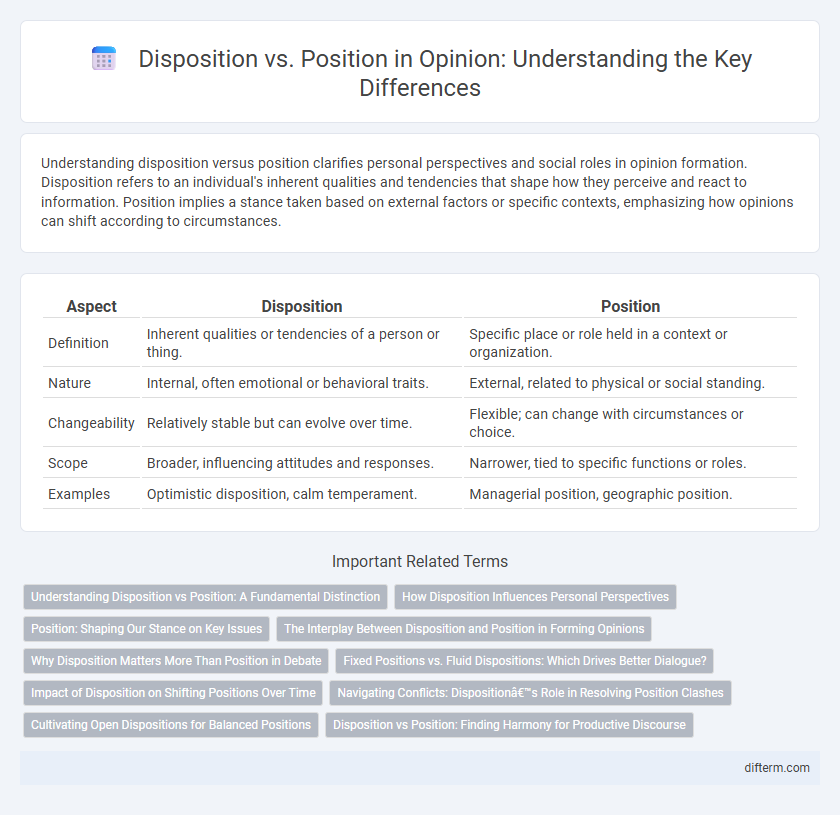Understanding disposition versus position clarifies personal perspectives and social roles in opinion formation. Disposition refers to an individual's inherent qualities and tendencies that shape how they perceive and react to information. Position implies a stance taken based on external factors or specific contexts, emphasizing how opinions can shift according to circumstances.
Table of Comparison
| Aspect | Disposition | Position |
|---|---|---|
| Definition | Inherent qualities or tendencies of a person or thing. | Specific place or role held in a context or organization. |
| Nature | Internal, often emotional or behavioral traits. | External, related to physical or social standing. |
| Changeability | Relatively stable but can evolve over time. | Flexible; can change with circumstances or choice. |
| Scope | Broader, influencing attitudes and responses. | Narrower, tied to specific functions or roles. |
| Examples | Optimistic disposition, calm temperament. | Managerial position, geographic position. |
Understanding Disposition vs Position: A Fundamental Distinction
Understanding disposition versus position hinges on recognizing that disposition reflects an individual's enduring tendencies or attitudes, while position refers to a specific stance taken on an issue at a particular moment. Disposition shapes behavior over time through deep-seated beliefs and emotions, whereas position is a deliberate choice often influenced by context, strategy, or new information. Distinguishing these concepts is crucial for accurately interpreting opinions and predicting responses in dynamic discussions.
How Disposition Influences Personal Perspectives
Disposition shapes personal perspectives by coloring how individuals interpret experiences and respond to challenges, often serving as a lens through which information is filtered. Unlike position, which is tied to external circumstances or roles, disposition reflects enduring emotional and cognitive tendencies that guide decision-making and bias perception. This intrinsic outlook fosters consistency in attitudes and reactions, impacting interpersonal relationships and conflict resolution.
Position: Shaping Our Stance on Key Issues
Position defines our explicit stance on critical issues, guiding decision-making and public discourse with clarity and conviction. It offers a structured framework that enables consistent advocacy and policy formulation aligned with core values and strategic objectives. Understanding one's position allows for effective communication and influence in shaping societal norms and legislative outcomes.
The Interplay Between Disposition and Position in Forming Opinions
Disposition shapes how individuals interpret information and emotionally respond to issues, while position reflects the specific stance they adopt on a topic. The interplay between disposition and position influences opinion formation by merging deep-seated attitudes with situational judgments. This dynamic interaction determines the consistency and strength of beliefs across different contexts.
Why Disposition Matters More Than Position in Debate
Disposition matters more than position in debate because it reflects a speaker's openness to understanding diverse perspectives, fostering constructive dialogue and enhancing credibility. A flexible disposition encourages critical thinking and adaptability, enabling participants to refine arguments based on new evidence rather than rigidly defending fixed stances. This approach promotes meaningful engagement and often leads to more persuasive outcomes than merely holding a strong, unyielding position.
Fixed Positions vs. Fluid Dispositions: Which Drives Better Dialogue?
Fixed positions often hinder productive dialogue by creating rigid stances that resist change, while fluid dispositions encourage openness and adaptability, fostering deeper understanding and collaboration. Emphasizing flexible attitudes allows individuals to explore diverse perspectives without defensiveness, enhancing communicative effectiveness in both personal and professional settings. Research in social psychology supports the notion that fluid dispositions contribute to more meaningful and dynamic conversations than entrenched fixed positions.
Impact of Disposition on Shifting Positions Over Time
Disposition profoundly influences the fluidity of positions, as underlying attitudes and inherent traits shape how perspectives evolve in response to new information or experiences. This intrinsic mindset drives the openness to reconsider or reinforce beliefs, thereby affecting the trajectory and stability of positions over time. Understanding the impact of disposition reveals why some individuals readily adapt their views while others maintain steadfast stances despite changing circumstances.
Navigating Conflicts: Disposition’s Role in Resolving Position Clashes
Disposition plays a crucial role in resolving conflicts by shaping how individuals interpret and respond to opposing positions, fostering empathy and openness. Unlike fixed positions, a flexible disposition allows for adaptive communication strategies that de-escalate tensions and facilitate collaborative problem-solving. Emphasizing disposition over position enables more effective navigation of conflicts, promoting mutual understanding and durable agreements.
Cultivating Open Dispositions for Balanced Positions
Cultivating open dispositions fosters intellectual humility, creating a foundation for balanced and well-informed positions. Embracing curiosity and empathy allows individuals to assess diverse perspectives critically, promoting nuanced understanding rather than rigid stance-taking. This approach encourages continuous learning and adaptability, essential for effective decision-making in complex social and professional environments.
Disposition vs Position: Finding Harmony for Productive Discourse
Disposition reflects an individual's inherent tendencies and attitudes that shape their approach to discussions, while position represents the explicit stance or argument taken on a specific issue. Balancing disposition and position fosters an environment where open-mindedness and assertiveness coexist, enabling more constructive and empathetic conversations. Recognizing the interplay between these elements enhances mutual understanding and leads to more productive discourse outcomes.
disposition vs position Infographic

 difterm.com
difterm.com